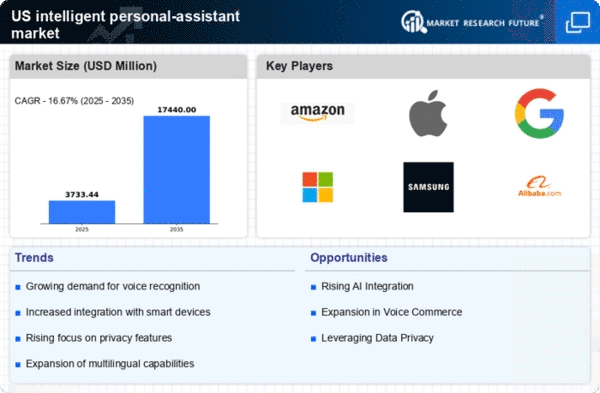Increased Focus on User Experience
The intelligent personal-assistant market is increasingly prioritizing user experience as a key driver of growth. Companies are recognizing that a seamless and intuitive interface is essential for user retention and satisfaction. Recent studies indicate that 70% of users are more likely to continue using a personal assistant that offers a user-friendly experience. This focus on user experience encompasses various aspects, including voice recognition accuracy, response time, and personalization features. As a result, developers are investing in research and development to enhance these elements, which is likely to lead to a more competitive market landscape. The emphasis on user experience not only fosters loyalty but also encourages new users to adopt intelligent personal assistants, thereby contributing to the overall expansion of the market.
Integration with E-commerce Platforms
The intelligent personal-assistant market is witnessing a growing trend of integration with e-commerce platforms, which is reshaping consumer shopping experiences. As more users turn to voice-activated assistants for online shopping, the market is expected to benefit from this shift. Data suggests that approximately 40% of consumers in the US have utilized voice assistants to make purchases, indicating a significant opportunity for retailers. This integration allows for seamless transactions, personalized recommendations, and enhanced customer engagement. As e-commerce continues to expand, the intelligent personal-assistant market is likely to evolve, with companies focusing on developing features that cater to the needs of online shoppers. This trend may lead to increased competition among service providers, ultimately benefiting consumers through improved services and offerings.
Advancements in Artificial Intelligence
The intelligent personal-assistant market is being significantly influenced by advancements in artificial intelligence (AI). Innovations in machine learning and natural language processing are enabling personal assistants to understand and respond to user queries with greater accuracy and context. This evolution is reflected in the increasing sophistication of AI algorithms, which are now capable of learning from user interactions and improving over time. As a result, the market is projected to expand, with estimates suggesting a growth rate of around 25% annually. The integration of AI not only enhances user satisfaction but also opens new avenues for applications in various sectors, including healthcare, finance, and education. This trend indicates a promising future for the intelligent personal-assistant market, as AI continues to redefine user expectations and capabilities.
Rising Demand for Voice-Activated Technology
The intelligent personal-assistant market is experiencing a notable surge in demand for voice-activated technology. As consumers increasingly seek hands-free solutions for everyday tasks, the market is projected to grow significantly. According to recent data, the adoption of voice-activated devices in the US has risen by approximately 30% over the past year. This trend is driven by the convenience and efficiency that voice commands offer, allowing users to manage their schedules, control smart home devices, and access information seamlessly. The integration of advanced natural language processing capabilities further enhances user experience, making interactions more intuitive. Consequently, this rising demand is likely to propel the intelligent personal-assistant market to new heights, as manufacturers strive to innovate and meet consumer expectations.
Growing Consumer Awareness of Digital Assistants
Consumer awareness regarding the capabilities and benefits of digital assistants is on the rise, significantly impacting the intelligent personal-assistant market. As more individuals become familiar with the functionalities of these assistants, their adoption rates are expected to increase. Recent surveys indicate that approximately 60% of US consumers are now aware of the various applications of intelligent personal assistants, ranging from scheduling appointments to providing real-time information. This heightened awareness is likely to drive demand, as consumers seek to leverage these technologies for enhanced productivity and convenience. Furthermore, as companies invest in marketing and educational initiatives to promote their products, the intelligent personal-assistant market is poised for substantial growth, potentially reaching a valuation of $10 billion by 2027.
















